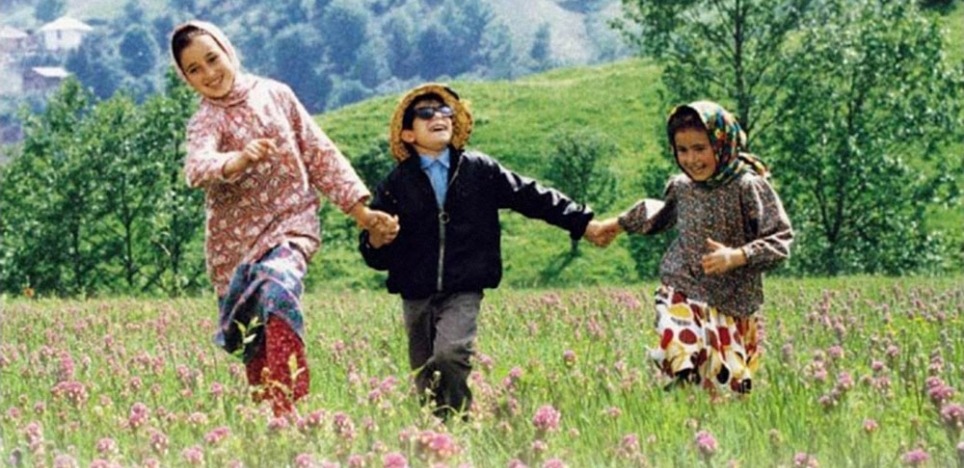Iranian writer and director Majid Majidi's film The Children of Heaven (1996) was nominated for an Academy Award in the Best Foreign Language Film category. His stories are simple, eloquent, and filled with a deep appreciation for the innocence and kind-heartedness of children.
Mohammad, the lead character in this unforgettable drama, is a blind eight-year-old boy who sees with the eyes of his heart. Whereas his life abounds with wonders, that of his father, a widower, is drenched with fear and misery. He's an ungrateful man. Mohammad's beloved grandmother is a devout Muslim who cherishes her grandson for the treasure he is.
Majid Majidi has made a spiritual film that speaks forcefully about the emptiness of a life without gratitude to God. We have organized this series of questions and exercises around some of the major themes in the film: the presence of God, kindness, touch, sounds, knowledge, ingratitude, and gratitude.
The Color of Paradise runs 90 minutes and is rated PG for thematic elements. For our review of the film and a plot synopsis, click here.
1. GOD IS EVERYWHERE
Eight-year-old Mohammad shares with a blind carpenter the following: "Our teacher says God loves the blind more because they can't see but I told him if it was so, he would not make us blind so we can't see him." The teacher answers, "God is not visible. He is everywhere because you can feel him. You see him through your fingertips."
- What character qualities make Mohammad such an extraordinary young boy? What one scene in the drama best conveys his delight in seeing God through his fingertips?
- What other films have you seen with blind people as wise ones or seers? In what ways do you feel the presence of the Invisible God?
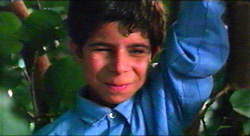
2. KINDNESS
According to the hadith (sayings) of the Prophet Muhammad, “A man once robbed some eggs from the nest of a bird, whereupon the Prophet had them restored to the nest."
- Share your reactions to the scene where Mohammad rescues the baby bird and puts it back in its nest.
- What role does kindness play in your spiritual life?
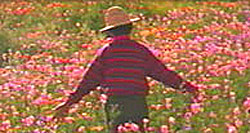
3. TOUCH
"Everything we touch becomes a jewel for our enjoyment," Thich Nhat Hanh writes in Cultivating the Mind of Love. "We do not have to possess them, because every jewel is available for our delight. Everyone and everything is a jewel."
- What is your favorite scene in the film reflecting Mohammad's appreciation for the bounties of nature? Discuss the meaning of the title of the film.
- Gratitude to God enables us to see everyone and everything as a jewel for our enjoyment. What precious gems have you touched recently?
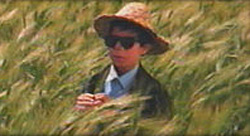
4. SOUNDS
"Sounds thicken the sensory stew of our lives, and we depend on them to help us interpret, communicate with, and express the world around us. Outer space is silent, but on earth almost everything can make a sound," Diane Ackerman observes in A Natural History of the Senses.
- What is the meaning of Mohammad's rapt attention to the sounds of birds singing and pecking at trees? What is he trying to discern?
- What sounds always stir a grateful note in your consciousness? What are your favorite sounds in the natural world?
5. KNOWLEDGE
In the sayings of Muhammad, it is written: "Acquire knowledge. It enables its possessor to distinguish right from wrong; it lights the way to heaven; it is our friend in the desert, our society in solitude, our companion when friendless; it guides us to happiness; it sustains us in misery; it is an ornament among friends and an armor against enemies."
- Why does Mohammad want so desperately to go to the school his sisters attend?
- Does your faith encourage your in the love of learning? What religions have a high regard for knowledge and learning?

6. INGRATITUDE
In one of the saddest scenes in the film, Mohammad's father says to his devout mother: "Why doesn't that great God of yours help me out of this misery? Why should I be grateful to him? For the things I don't have, for the miseries, for a blind child, for the wife I have lost?"
- Discuss the difference between Mohammad's father and his grandmother in terms of their outlook on life.
- How would you answer Mohammad's father? Have you ever felt like him? What was the situation?
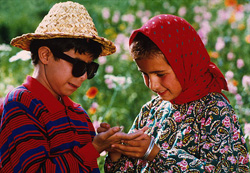
7. GRATITUDE
In The Music of Silence, David Steindl-Rast writes: "Life is given to us; every moment is given. The only appropriate response therefore is gratefulness. When we wake up to the fact that everything is a gift, it is only natural to be thankful and to look on everything that happens as a chance to respond to the given life."
- Share your responses to the ambiguous ending of The Color of Paradise. What do you think it means?
- Make a list of things you have learned about the spiritual practice of gratitude from this movie.
This guide is one in a series of more than 200 Values & Visions Guides written by Frederic and Mary Ann Brussat. Text copyright 2001 by Frederic and Mary Ann Brussat. Photos courtesy of Columbia Pictures. This guide is posted as a service to visitors to www.SpiritualityandPractice.com. It may not be photocopied, reprinted, or distributed electronically without permission from Frederic and Mary Ann Brussat — except it may be duplicated for use by groups participating in the e-course "Going to the Movies as a Spiritual Practice." For other uses and for a list of guides in the Values & Visions series and ordering information, email your name and mailing address to: brussat@spiritualrx.com.
